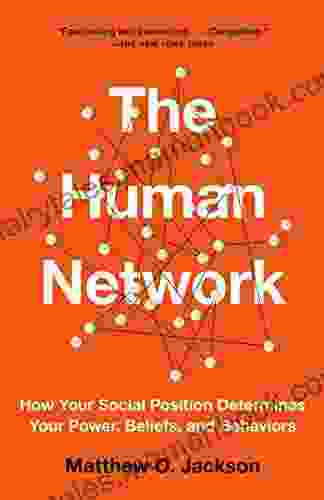Power is a fundamental aspect of human society. It is the ability to influence or control the behavior of others, and it can be manifested in many different forms, from physical strength to economic resources to social status. However, power is not evenly distributed. Some people have more power than others, and this can have a significant impact on their beliefs and behaviors.
In this article, we will explore the relationship between social position and power beliefs and behaviors. We will first discuss how social position can influence people's beliefs about power. We will then examine how power beliefs can shape people's behaviors. Finally, we will consider the implications of these findings for social policy and practice.
4.5 out of 5
| Language | : | English |
| File size | : | 20094 KB |
| Text-to-Speech | : | Enabled |
| Screen Reader | : | Supported |
| Enhanced typesetting | : | Enabled |
| X-Ray | : | Enabled |
| Word Wise | : | Enabled |
| Print length | : | 346 pages |
| Item Weight | : | 1.57 pounds |
Social Position and Power Beliefs
Social position is a key determinant of people's beliefs about power. People who occupy high-status positions in society are more likely to believe that power is legitimate and that they deserve to have it. They are also more likely to believe that they have the ability to influence others. In contrast, people who occupy low-status positions in society are more likely to believe that power is illegitimate and that they do not deserve to have it. They are also more likely to believe that they are powerless to influence others.
There are several reasons why social position can influence people's beliefs about power. First, people's social position shapes their experiences with power. People who occupy high-status positions are more likely to have positive experiences with power, such as being able to achieve their goals and influence the behavior of others. In contrast, people who occupy low-status positions are more likely to have negative experiences with power, such as being dominated and controlled by others. These experiences can lead people to develop different beliefs about power.
Second, people's social position shapes their access to information about power. People who occupy high-status positions are more likely to have access to information about how power works, who has it, and how it can be used. This information can help people to develop more sophisticated beliefs about power. In contrast, people who occupy low-status positions are more likely to have limited access to information about power. This can lead people to develop more simplistic and inaccurate beliefs about power.
Third, people's social position shapes their social networks. People who occupy high-status positions are more likely to have relationships with other high-status people. These relationships can provide people with access to information and support, which can help them to develop more positive and confident beliefs about power. In contrast, people who occupy low-status positions are more likely to have relationships with other low-status people. These relationships can provide people with limited access to information and support, which can lead them to develop more negative and self-limiting beliefs about power.
Power Beliefs and Behaviors
People's power beliefs can have a significant impact on their behaviors. People who believe that they have power are more likely to act in ways that reflect that belief. They are more likely to be assertive, take risks, and try to influence others. In contrast, people who believe that they are powerless are more likely to act in ways that reflect that belief. They are more likely to be passive, avoid conflict, and defer to others.
There are several reasons why power beliefs can shape people's behaviors. First, power beliefs can influence people's self-efficacy. Self-efficacy is the belief that one has the ability to achieve a desired outcome. People who believe that they have power are more likely to believe that they can achieve their goals. This can lead them to take more action and take more risks. In contrast, people who believe that they are powerless are less likely to believe that they can achieve their goals. This can lead them to avoid taking action and give up easily.
Second, power beliefs can influence people's motivation. People who believe that they have power are more likely to be motivated to achieve their goals. They are more likely to set high goals and work hard to achieve them. In contrast, people who believe that they are powerless are less likely to be motivated to achieve their goals. They are more likely to set low goals and give up easily.
Third, power beliefs can influence people's social interaction. People who believe that they have power are more likely to be assertive and take charge in social situations. They are more likely to express their opinions and try to influence the behavior of others. In contrast, people who believe that they are powerless are less likely to be assertive and take charge in social situations. They are more likely to defer to others and avoid conflict.
Implications for Social Policy and Practice
The findings of this research have important implications for social policy and practice. First, they suggest that the distribution of power in society can have a significant impact on people's beliefs and behaviors. This means that policies that aim to reduce inequality and promote social justice can have a positive impact on people's lives. For example, policies that provide people with access to education, healthcare, and economic opportunities can help to empower people and give them a greater sense of control over their lives.
Second, the findings of this research suggest that people's beliefs about power can be changed. This means that it is possible to intervene to help people develop more positive and empowering beliefs about power. This can be done through education, training, and counseling. For example, programs that teach people about the nature of power and how it can be used can help to empower people and give them a greater sense of control over their lives.
Finally, the findings of this research suggest that the social context in which people live can have a significant impact on their beliefs and behaviors. This means that it is important to create social environments that support people's sense of power. This can be done by creating opportunities for people to participate in decision-making, giving people access to resources, and providing people with support and encouragement.
Power is a fundamental aspect of human society. It can be used for good or for evil, and it can have a profound impact on people's lives. The distribution of power in society can influence people's beliefs and behaviors, and the social context in which people live can shape their sense of power. By understanding the relationship between social position, power beliefs, and behaviors, we can develop policies and practices that promote social justice and empower people.


















































































































